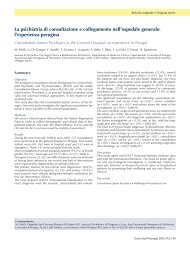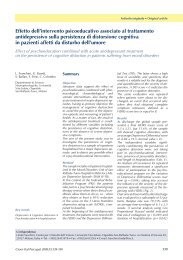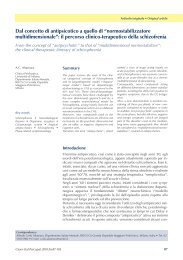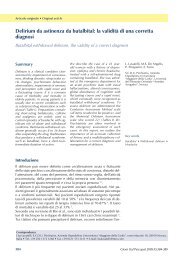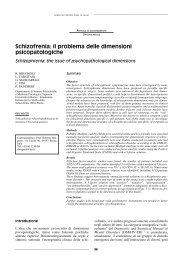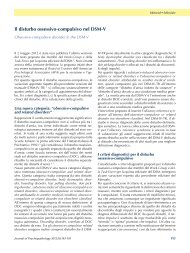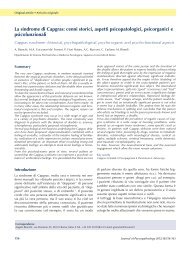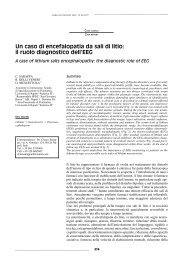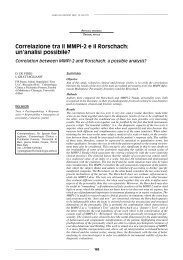XI Congresso della Società Italiana di Psicopatologia Psichiatria ...
XI Congresso della Società Italiana di Psicopatologia Psichiatria ...
XI Congresso della Società Italiana di Psicopatologia Psichiatria ...
Create successful ePaper yourself
Turn your PDF publications into a flip-book with our unique Google optimized e-Paper software.
POSTER<br />
was necessary in order to test the efficacy of a new drug,<br />
but, more surprisingly, only 20% of them knew the existence<br />
of a French law passed in order to protect the rights of<br />
the subjects involved in a clinical trial! From an ethical<br />
point of view, coming from the Hippocratic writings, three<br />
principles are fundamental in the patient-physician relationship:<br />
1. the principle of Good Will (“I will come for the benefit<br />
of the sick”) and of Not Ill Will (“First, do not harm”);<br />
2. the principle of Justice (“insuring that the patients bearing<br />
the greatest burden for research also benefit from it” 1 ; 3.<br />
the principle of the Respect of the Person (“People have the<br />
right to health and health care” (art. 32 of the Italian Constitution<br />
and arts. II-63 e II-95 of the European Constitution).<br />
Because the decisional capacity or competence could<br />
be impaired by a severe acute episode of a given <strong>di</strong>sorder, a<br />
so called Psychiatric Will of anticipated <strong>di</strong>rective expressed<br />
by the patient, could be a way to overcome a temporary state<br />
of non-competence. A Consent Au<strong>di</strong>tor, to testify and control<br />
the process of consent could be of some help and lastly<br />
the Local Ethics Committee should guarantee a deep and<br />
careful examination of the tests of the informed consent and<br />
the monitoring of the ongoing clinical trial. Some methodological<br />
suggestions have been published in order to ameliorate<br />
the comprehension and the effectiveness of a consent:<br />
1. use of “open ended questions” and avoidance of<br />
“close ended questions”; 2. give time to the patient to think<br />
about the proposal of taking part in the trial; 3. pay attention<br />
to the language used: it has to be clear and not too “me<strong>di</strong>cal”;<br />
4. invite the patient to <strong>di</strong>scuss the form of the consent<br />
and the study information sheet with his relatives, his general<br />
practitioner or “other relevant people” to obtain opinion,<br />
clarification and support about his decision to participate<br />
in the study.<br />
The informed consent should explain to the patient the plan<br />
of the study (visits, laboratory tests), how many patients<br />
have been treated before him, that the confidentiality of sensitive<br />
personal data is respected, the known risks and adverse<br />
effects of the study drugs, the possibility of unknown<br />
risks, the possible alternative treatments available and the<br />
complete liberty of his participation. Vulnerable subjects<br />
should not be involved in trials (even if methodologically<br />
well designed) where the benefit for the patients is not guaranteed<br />
(for example in dose fin<strong>di</strong>ng stu<strong>di</strong>es or in stu<strong>di</strong>es<br />
where the placebo is used). In vulnerable categories of subjects<br />
(children, elderly, psychiatric and oncologic patients) it<br />
is extremely <strong>di</strong>fficult to make them accept the concept of<br />
collective benefit of the “experimental” stu<strong>di</strong>es over the in<strong>di</strong>vidual<br />
and personal benefit due to the “therapeutic” stu<strong>di</strong>es.<br />
It is not right because it could be a therapeutic misconception.<br />
For them the in<strong>di</strong>vidual benefit must always prevail<br />
over collective benefit.<br />
Furthermore, because of the large choice of active me<strong>di</strong>cations<br />
in psychiatric <strong>di</strong>sorders and the well documented protective<br />
role of the pharmacotherapy in the evolution of the<br />
<strong>di</strong>sorders, the use of the placebo must be limited or, even<br />
better, avoided. In accordance to the last version of the Declaration<br />
of Helsinki 3 the use of the placebo is justified in a<br />
very narrow range of situations, first of all when a standard<br />
treatment of proven efficacy for a given pathological con<strong>di</strong>tion<br />
does not exist. The use of the placebo could be tolerated<br />
when a double dummy design is requested but all the patients<br />
are guaranteed to be treated with an active me<strong>di</strong>cation<br />
and when the duration of the placebo treatment is very short<br />
(wash out or run-in periods).<br />
References<br />
1 Wiess Roberts L, Dyer AR. Ethics in Mental Health Care. Washington,<br />
DC: Am Psych Pub 2004.<br />
2 Gerard-Coue MG, Rouillon F, Dreyfus JD. Survey for participation<br />
in therapeutic trial in psychiatry. Encephale 1994;20:421-6.<br />
3 Declaration of Helsinki, 52 nd General Assembly of the WMA<br />
(E<strong>di</strong>mburgh, 2000).<br />
160. Quetiapina: tollerabilità e sicurezza<br />
ad alti dosaggi<br />
P. Mainini, B. Ragni<br />
Dipartimento <strong>di</strong> Salute Mentale Nord, ASL 13, Novara<br />
Introduzione: l’efficacia e la tollerabilità <strong>della</strong> quetiapina<br />
in campo psichiatrico è confermata da tempo a livello internazionale.<br />
L’uso presso la nostra struttura e l’osservazione<br />
dei pazienti in terapia con quetiapina in questi ultimi tre anni<br />
hanno permesso <strong>di</strong> evidenziare la scarsità <strong>di</strong> effetti collaterali<br />
anche a dosaggi elevati. Partendo da questi presupposti<br />
si è attuato uno stu<strong>di</strong>o allo scopo <strong>di</strong> evidenziare la tollerabilità<br />
<strong>di</strong> quetiapina anche a dosaggi superiori al range <strong>di</strong><br />
scheda tecnica, dosaggi motivati dal quadro clinico presentato<br />
dal paziente.<br />
Metodologia: lo stu<strong>di</strong>o <strong>di</strong> tipo osservazionale prospettico è<br />
stato condotto da gennaio a settembre 2005; sono stati inclusi<br />
un totale <strong>di</strong> 14 pazienti, 12 con <strong>di</strong>agnosi <strong>di</strong> schizofrenia, 2 con<br />
<strong>di</strong>agnosi <strong>di</strong> psicosi isterica. I dosaggi utilizzati erano compresi<br />
in un range <strong>di</strong> 900-1200 mg <strong>di</strong>e; la titolazione è stata rapida,<br />
con monitoraggio <strong>della</strong> pressione arteriosa, <strong>della</strong> frequenza<br />
car<strong>di</strong>aca, del QT, del peso e dei parametri ematici.<br />
Risultati: i risultati hanno confermato l’estrema tollerabilità<br />
<strong>della</strong> molecola, non sono state infatti evidenziate <strong>di</strong>fferenze<br />
significative sugli effetti collaterali rispetto ai dosaggi più<br />
bassi. La tollerabilità stessa ha permesso una totale aderenza<br />
al programma terapeutico con una totale compliance alla<br />
terapia stessa.<br />
Bibliografia<br />
Pancheri P, a cura <strong>di</strong>. Farmacoterapia psichiatrica. 2003.<br />
Tasman A, Key J, Lieberman JA. Psychiatry. 2005.<br />
161. Duloxetina nel trattamento a lungo<br />
termine <strong>della</strong> depressione maggiore<br />
M. Mancini, A. Barraco, A. Rossi<br />
Ely Lilly Italia S.p.A.<br />
Obiettivi: la depressione maggiore (DM) è una patologia<br />
cronica ricorrente e le linee guida raccomandano la terapia<br />
a lungo termine. Questo stu<strong>di</strong>o ha valutato, in pazienti con<br />
depressione maggiore (DSM-IV), la sicurezza e l’efficacia<br />
<strong>della</strong> terapia a lungo termine (1 anno) con duloxetina, inibitore<br />
<strong>della</strong> ricaptazione <strong>di</strong> serotonina e <strong>di</strong> noradrenalina.<br />
Meto<strong>di</strong>: stu<strong>di</strong>o multinazionale, in aperto, in pazienti ambulatoriali<br />
(età minima 18 anni) che ricevevano duloxetina da<br />
80 mg/<strong>di</strong>e a 120 mg/<strong>di</strong>e per 1 anno.<br />
296



